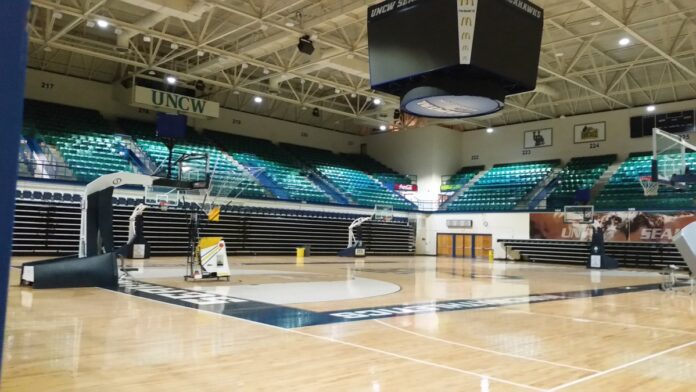
WILMINGTON — UNCW is in the early stages of developing a new basketball arena and potential concert venue, a step-up for a team increasingly gaining more recognition on the national level.
READ MORE: In its infancy, UNCW NIL program is providing athletes money but also real-life work experience
Last fall, UNCW Athletics launched a feasibility study into upgrading Trask Coliseum, either through renovation or a new replacement stadium. The UNCW Board of Trustees approved either option as part of the university’s new 10-year master plan in August 2024.
UNCW hired Conventions, Sports & Leisure Internationl to conduct the study — the evaluation of a new tennis is also included in the scope of work — and provide a report of its funding; the contract is for $90,000.
UNCW’s men’s and women’s basketball teams compete in Trask, built in 1977, only six years after the opening of the college’s oldest dorm Galloway Hall, which was torn down last year.
The most recent improvements to the 5,200-seat venue have been a $2-million renovation in 2011, which included the installation of a video board and LED courtside boards; new LED lighting was installed in 2013. Though structurally sound, the building remains dated, UNCW Athletics Director Mike Oblinger told Port City Daily in an interview on May 30.
“Some of the amenities that other buildings, newer buildings, enjoy — we just don’t have that capability,” Oblinger said. “Mostly it’s around the fan amenities. It’s concessions, it’s food quality; we don’t really have a true area for fans to buy gear and team-shop and things like that.”
Oblinger noted Trask doesn’t offer premium seating options either, such as suites or club seats that offer an enhanced viewing experience for a higher ticket price. As the teams gain more acclaim — the men’s basketball team made it to the first round of this year’s NCAA championship, where it lost to Texas Tech — these coliseum enhancements are aimed at further enriching the fan experience.
The vision for UNCW’s new arena aims to be similar to other NCAA Division I schools in the UNC System, such as UNC Chapel Hill’s Dean. E Smith Center (opened in 1986) and N.C. State’s Lenovo Center (opened in 1999). Both offer multiple concession and merchandise areas surrounding the court, along with other food vendor stands dispersed throughout. The Lenovo Center is also home to the Carolina Hurricanes ice hockey team and regularly books A-list music artists, including Beyonce, Taylor Swift and Post Malone.
CSL is exploring hosting concerts at the new arena, as Trask has done in the past. It has hosted Frank Sinatra, The Righteous Brothers, Darius Rucker and the Goo Goo Dolls.
Oblinger said the team has not decided yet on a new build or renovation, which would displace the teams. Any new structure would have to fall in the general vicinity of Trask’s current 15,000-square-feet footprint at the front of campus.
In fact, UNCW hasn’t decided if it’s moving forward with a new arena at all. Oblinger said a lot of financial decisions, not just at UNCW but across NCAA athletics, are riding on what’s called “the House decision.”
Grant House and Sedona Prince v. National Collegiate Athletic Association, et al is a class action lawsuit against the NCAA and five athletic conferences. Two student athletes sought name, image, and likeness (NIL) damages and an injunction to force the NCAA and affiliated athletic conferences to lift restrictions on revenue-sharing from broadcast rights.
The NCAA voted to settle the lawsuit for $2.75 billion in May 2024 and agreed to a revenue-sharing model, allowing member institutions to distribute up to $20 million to Division I athletes that have played since 2016. It would also allow direct payments from schools to athletes and increasing regulation of NIL deals.
The settlement is an attempt to level the playing field four years after NIL compensation was legalized, meaning student athletes can now make brand deals and get paid. The settlement will curtail high-profile programs from outspending opponents in attempts to attract players and likely reduce the amount of money athletes can earn, particularly from collectives organized by school booster clubs.
Judge Claudia Wilken is expected to rule on validating the settlement any day now. It is supposed to take effect July 1.
“I think if you talk to my peers throughout the country, a variety of facility projects would either be put on hold or paused or eliminated altogether because of the revenue-sharing potential that the House settlement might bring,” Oblinger said.
If approved, athletes will essentially be able to take a cut of the money that comes in from media rights deals, sponsorships and revenue generated from tickets, food and merchandise sold at sports arenas.
“If we’re going to continue on and do a renovation of a building, well, then, that can’t be at the detriment of not having the ability to compete with NIL in that space,” Oblinger said.
In the meantime, CSL and UNCW have sent out a survey to college alumni, season ticket holders and others in the UNCW Athletics database to gauge what they would like to see in a new arena.
Oblinger said they are still reviewing feedback from the survey now and didn’t give many details about it last week. Oblinger did share overall there were positive responses, with everyone in agreement that an update to the coliseum should be made.
Reach journalist Brenna Flanagan at brenna@localdailymedia.com.
Want to read more from PCD? Subscribe now and then sign up for our newsletter, Wilmington Wire, and get the headlines delivered to your inbox every morning.



